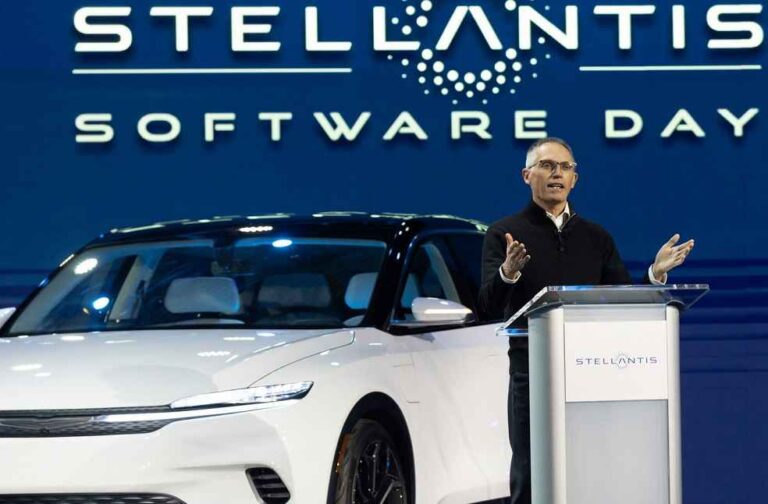In a surprising shakeup for the automotive industry, Stellantis CEO Carlos Tavares has stepped down, marking the end of an era for the world’s fourth-largest automaker. The company, which oversees iconic brands like Jeep, Peugeot, Ram Trucks, and Alfa Romeo, announced the resignation on Sunday, citing a breakdown in alignment between Tavares and the board. His abrupt departure comes amid a turbulent year for Stellantis, characterized by plunging sales, falling stock prices, and increasing internal and external pressures.
Here's ads banner inside a post
Leadership Turmoil in a Difficult Year
The announcement follows a year of significant challenges for Stellantis. The company’s stock price has nosedived by more than 50%, dropping from a high of $29 in March to just $13.20 as of Friday. The automaker’s third-quarter financial results, released in October, painted a grim picture: net revenues of $34.7 billion, a steep 27% decline compared to the same period last year, fueled by a 20% reduction in vehicle shipments.
Tavares’ resignation underscores the growing tension between the board and the executive leadership. According to Stellantis Chairman John Elkann, the company is already working on finding a new CEO and plans to announce a successor in the first half of 2025. Elkann expressed gratitude for Tavares’ contributions, stating, “Our thanks go to Carlos for his years of dedicated service and the role he has played in the creation of Stellantis. Together, we will ensure the continued deployment of the company’s strategy in the long-term interests of Stellantis and all of its stakeholders.”
Disagreements with the Board
While Tavares’ resignation was officially presented as a mutual decision, senior independent director Henri de Castries highlighted recent differences in strategic vision between the CEO and the board. “The company’s success has been rooted in a perfect alignment between shareholders, the board, and the CEO. However, in recent weeks, different views have emerged, which have resulted in today’s decision,” de Castries said.
Here's ads banner inside a post
These differing views likely stem from Stellantis’ struggles to navigate a challenging automotive landscape, including rising competition, shifting consumer preferences, and the costly transition to electric vehicles. The company has faced criticism for its handling of these challenges, with some stakeholders pointing to leadership missteps as a key factor in its underperformance.
A Legacy of Transformation
Carlos Tavares, 66, played a pivotal role in shaping Stellantis into a global powerhouse. He was instrumental in orchestrating the landmark merger between Fiat Chrysler and Peugeot in January 2021, a move that created Stellantis and positioned it as a leader in the automotive world. Under his leadership, the company pursued ambitious electrification goals and operational efficiencies.
However, the past year has called Tavares’ strategy into question. Declining sales, shrinking revenues, and escalating tensions with labor unions have fueled discontent among shareholders and employees alike. The United Auto Workers (UAW) union, which has been vocal about worker grievances under Tavares’ tenure, welcomed the news of his resignation. “This is a major step in the right direction for a company that has been mismanaged and a workforce that has been mistreated for too long. We are pleased to see the company responding to pressure and correcting course,” the union said in a statement.
Here's ads banner inside a post
What Lies Ahead for Stellantis?
Stellantis now faces the daunting task of rebuilding investor confidence and stabilizing its operations. With the global automotive industry undergoing rapid transformation, the new CEO will need to address several critical challenges, including accelerating the company’s electric vehicle strategy, restoring profitability, and mending strained relationships with employees and stakeholders.
In the interim, Stellantis has established an Executive Committee to manage operations and ensure the company remains on track. Chairman Elkann expressed confidence in the team’s ability to guide Stellantis through this transitional period, emphasizing the importance of long-term strategic alignment.
The Road Forward
Carlos Tavares’ resignation signals a pivotal moment for Stellantis. As the company begins its search for new leadership, all eyes will be on how it navigates this period of uncertainty. With steep competition, evolving market demands, and mounting expectations for sustainable growth, the next chapter in Stellantis’ story will be crucial in determining its future as an automotive leader.
For now, the resignation of one of the industry’s most prominent executives has set the stage for significant changes, leaving stakeholders hopeful that fresh leadership will bring the transformation Stellantis urgently needs.

